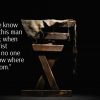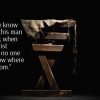As someone who came from outside the liturgical expressions of Christianity, I had a certain suspicion of the whole enterprise. I thought the liturgical tradition, with its vestments, rituals, rules, and customs, was the very thing Jesus had come to destroy. I intuited that what God wanted was a broken and contrite heart. He owned the cattle on a thousand hills; he didn’t need our formalized prayers and spiritual sacrifices.
The heroes in my mind were characters like David, who danced informally before God (2 Sam. 6:14), and the prophets, whose ministry was led from start to finish by the Spirit (1 Kings 18:12). The liturgical life seemed, from the outside, to stifle the Spirit.
In my developing religious sensibilities, inherited from the Free Church Protestantism of my youth, the legalists Paul battled in Galatia had morphed into modern ritualistic Christians. Jesus wanted prayers from my heart that revealed my own wrestling with God, not the repeated words of those long dead. God was, of course, on the side of the informalists and against the formalists. In the language that became omnipresent during my college years, it wasn’t about religion but relationship. Religion was shorthand for any ritual activity I was uncomfortable with.
Here, I want to approach the liturgy from a different perspective. I do not wish to engage in debates about particular texts of the Bible. I want instead to zoom out and look at the nature of the Old and New Testaments themselves. I want to press in on the method by which God forms a people. When God revealed himself to a spiritually malnourished group who needed to be taught the things required for holiness, what did he do? How did God do it?
He gave his people rituals. He gave them feasts tied to certain parts of the year and a system of sacrifice to teach his ways to coming generations:
When in the future your child asks you, “What does this mean?” you shall answer, “By strength of hand the Lord brought us out of Egypt, from the house of slavery. When Pharaoh stubbornly refused to let us go, the Lord killed all the firstborn in the land of Egypt, from human firstborn to the firstborn of animals. Therefore I sacrifice to the Lord every male that first opens the womb, but every firstborn of my sons I redeem.” (Ex. 13:14–15, NRSV)
Established prayers and actions pass on the faith—not as magic activities that contain meaning in themselves but as occasions for remembering. And these rituals are not in conflict with deeply emotive experiences of God. Every psalm and song, every word of prayer and lament in the Old Testament, was written by Jewish people steeped in the rituals of Israel. The deeply personal relationship with God demonstrated in the Psalms, Jeremiah, and Isaiah gives lie to the idea that God only values informality.
Some might be tempted to ask, “Didn’t Jesus come to do away with all those rituals to worship in spirit and in truth (John 4:24)? Wasn’t the law a shadow of things to come (Col. 2:17)?” Well, sort of. The Old Testament sacrificial and liturgical system pointed toward Christ as the fulfillment of the law. Referring to the law as a shadow speaks to its fulfillment in Christ. The reference to “shadows,” however, does not speak to ritual as a means of spiritual formation. It does not eliminate the possibility that ritual can be a means of encountering the living God.
Stories and rituals pass on understanding. Jesus knew this. During his last night with his disciples, he did not have them memorize a position paper on the meaning of the Atonement; he gave them a meal—a ritual with set words and actions that immediately entered the life of the early church.
That is why Paul can say, “I received from the Lord what I also passed on to you: The Lord Jesus, on the night he was betrayed, took bread” (1 Cor. 11:23). He refers to central aspects of Christian doctrine, like the Resurrection and ritual activities, as things he received (1 Cor. 11:23; 15:1–3).
As Christians, then, both the ritual piety and the apostolic doctrines are part of our inheritance. This doesn’t mean that ritual or even the Lord’s Supper is limited to a pedagogical technique. Christians throughout the centuries have maintained that God comes to meet us in and through things like the bread and wine of the Eucharist. Christ doesn’t just teach us about himself in communion; he comes to us and nourishes the weary believer. We can have both. Ritual is a means of spiritual formation (we learn through repetition) and an encounter (God meets us in the act of worship and praise in the liturgy).
What does any of this have to do with Lent and its prayers? The set prayers of Lent are not a limitation on Christian devotion. They do not stand in the way of offering our own heartfelt cries to God. They are a way of accepting that we are not the first ones to encounter the God who has tossed our lives into a glorious confusion. Others have left a testimony. Their witness deserves to be heard.
This essay was adapted from Lent, ©2022 by Esau Daniel McCaulley. Used by permission of InterVarsity Press. www.ivpress.com.
















Post comments (0)